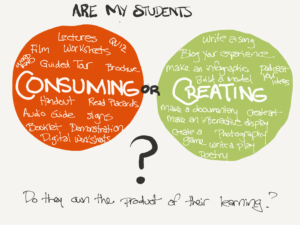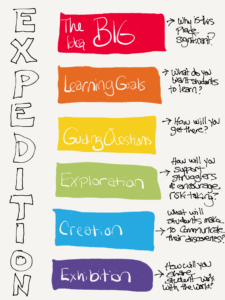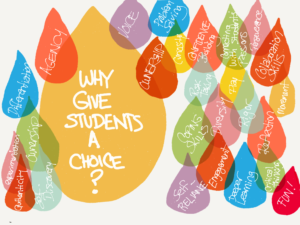Hello, World! Making learning mobile with technology
This week, I am presenting at iPadpalooza in Austin, TX. It’s a great 3-day conference full of amazing ideas about the best applications of EdTech in our classrooms. Every session has been amazing, and there are some cool special events, too! I am having a blast learning and networking with teachers who are doing really innovative things in their schools.
My presentation is about making learning mobile by using technology to take learning out of the classroom and into the world. This concept is not my own — some people call it learning expeditions, mobile learning, outdoor classrooms, etc… but it is an idea that I promote wholeheartedly, and I hope to see more schools embracing opportunities to get out of classrooms and into the community. As a public artist, I like to get out into the community a lot and collaborate with people in the community to create meaningful things. I think students ought to be doing the same with their work. If work doesn’t have relevance outside school, it probably isn’t that meaningful to the student, right? Everyone wants to do work that matters.
Most field trips are about consuming content created by other people. Students listen to a talk, watch a demonstration, see a film, read the museum placards, etc… but really don’t interact with the space that much. It’s fun, and it’s exciting, but how much do students actually learn? In a learning expedition, students may consume some content at the beginning of the visit, but spend most of their time exploring, discovering, experimenting, and really learning in an authentic way; then create things to share what they learned with other people.
A learning expedition starts with a Big Idea. This idea is something like, “hey, why don’t we go to the art gallery?” Why do we want to go to this place? What can this place teach us? What is the “big idea” of this place? That will be the hook to get students (and administrators!) on board with this plan.
Next, we figure out our Learning Goals. What, specifically are we going to learn at the museum? These goals can be something from your state standards, or could be other learning objectives or skills. It is important to pick 2-3 strong learning goals for this trip to plan your visit around. We will use these goals to create Guiding Questions to ask our students as they discover on their own. These questions will guide them to learn what we want them to, but they’re going to do it on their own. Students will refer to these questions throughout the Exploration phase, when they really interact with the space to discover what they can learn from it. While some front-loading of information may be necessary, the idea of a learning expedition is to keep passive learning to a minimum and have students actively learning through collaboration, experimentation, and figuring things out on their own. Once students have the answers to the Guiding Questions, they will Create something to share what they’ve learned with the public. It is best to give students a choice in how and what they create, for many reasons I will discuss in a minute. The idea is to let students decide how to share what they know. Eventually, their work will be shared with the rest of the world (or the greater school community) through some sort of Exhibition, be it digital or in person.
Giving students a choice in the form their work takes and the way they create it is so important. It gives students:
- the opportunity to speak in their own voice
- agency in their learning
- ownership of their work
- coping skills
- critical thinking
- self-reliance
- opportunities to share their passions
- and so many more reasons!
When we tell students how and what to create, we rob them of their voice. The work is no longer truly theirs… they’re doing OUR work. This leads to lower engagement and less meaningful work. Giving students some choice (even just a few options) gives them a chance to really own both their learning process and the products of their learning, so I highly recommend not specifying one form for the work to take.
Students, like adults, want to do work that is meaningful, relevant, and that reflects their passions. Learning expeditions are a way to give students the opportunity to learn like adults do, and to create work that means something beyond just getting a grade. I’m really looking forward to presenting this concept at iPadpalooza tomorrow!


